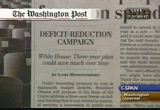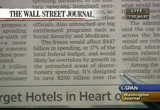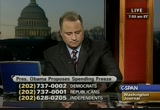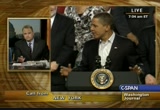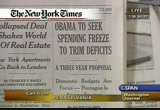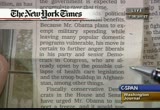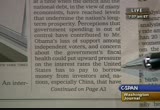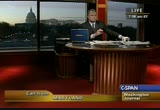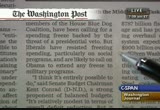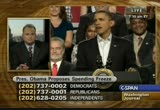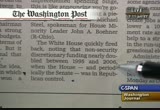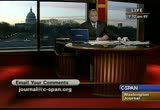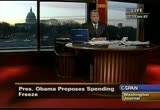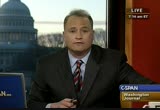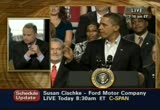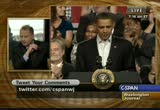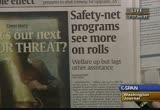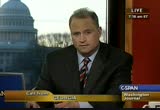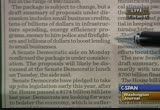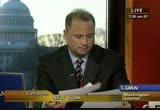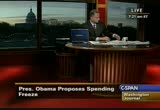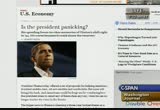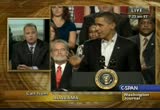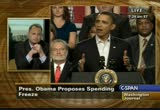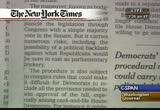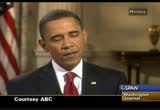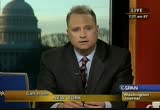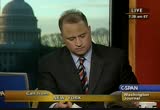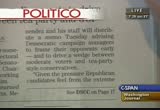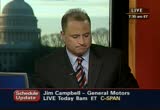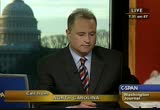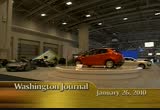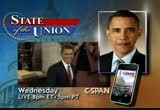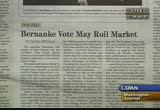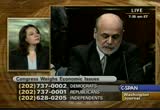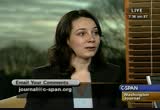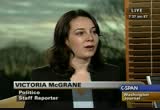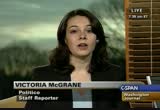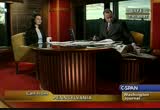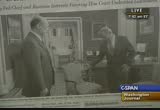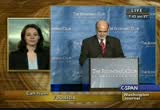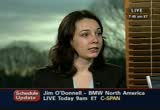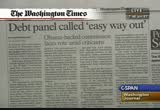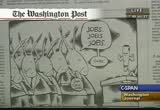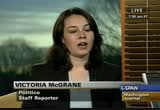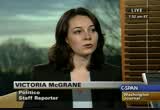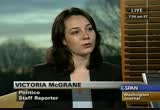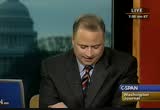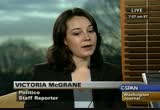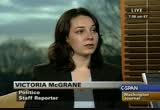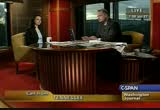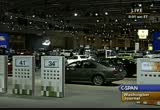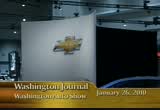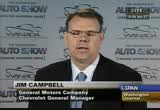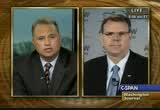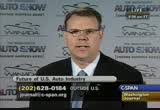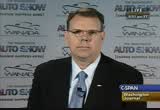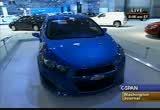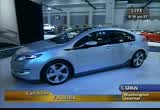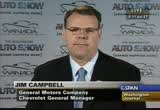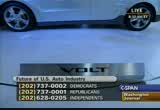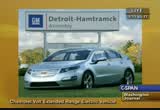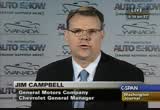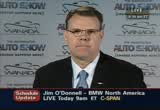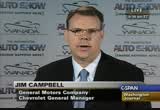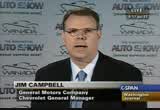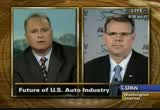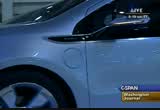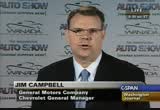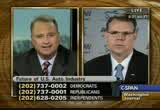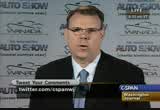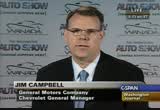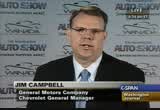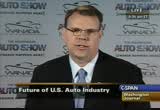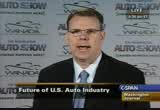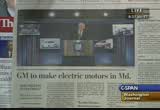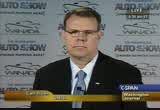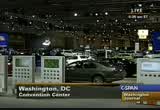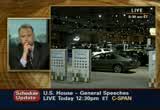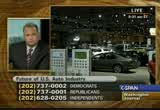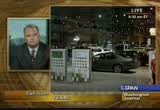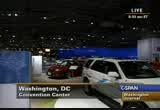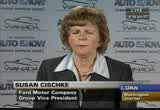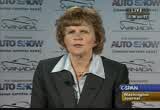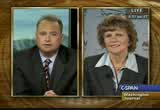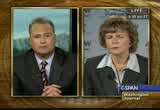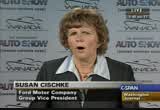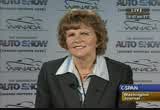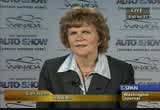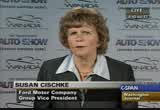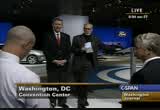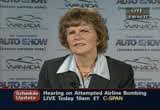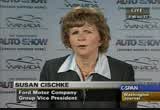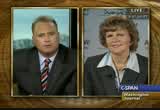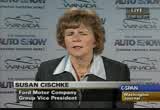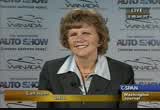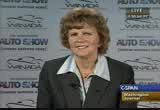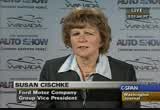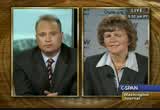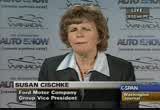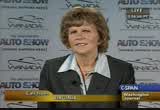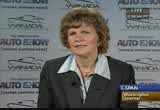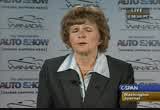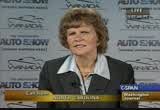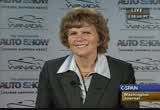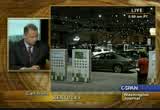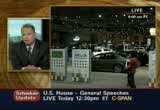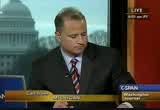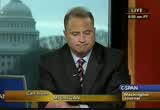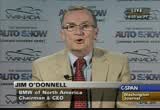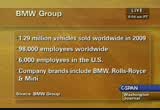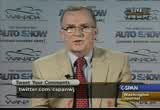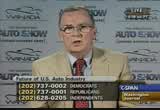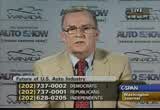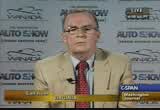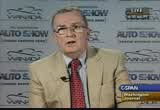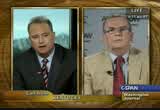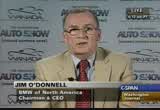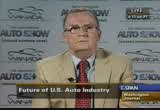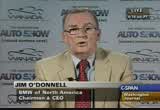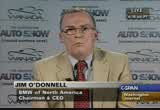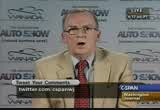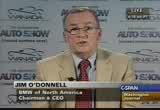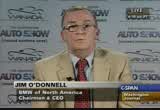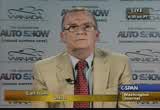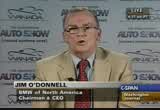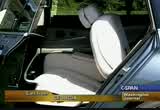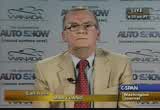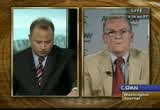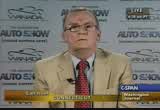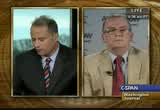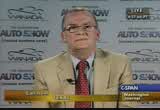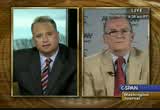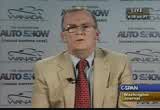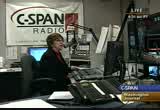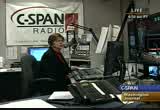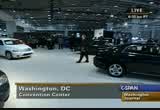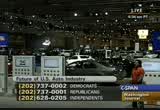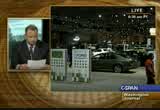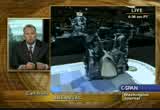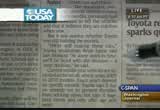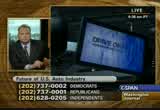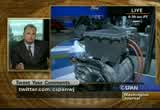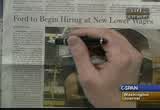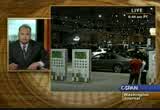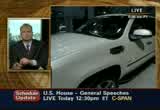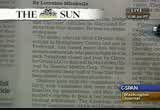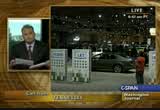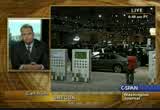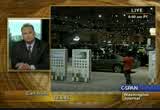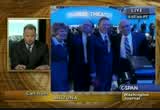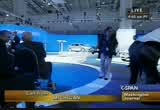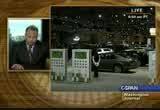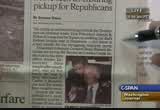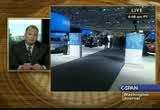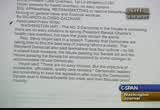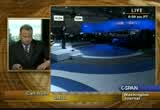tv Washington Journal CSPAN January 26, 2010 7:00am-10:00am EST
7:00 am
from the nation's capital this is "washington journal." host: alive the picture from the floor of the washington ought to show at the convention center. lots of new car models to look at. the focus on alternative fuels, and plenty of executives and officials. we will learn all about the decisions washington makes and their impact on the auto industry. in the meantime president obama is set to propose a freeze on a portion of federal spending today. it could dramatically curtail his legislative ambitions. we want to get your thoughts. he will talk about it on the
7:01 am
state of the union address tomorrow. here is the headline on the story. obama to propose a freeze on spending. the subhead it goes this way -- deficit reduction campaign. the white house says the three- year plan could save much money over time. if you look at the lead to the wall street journal did put it this way, there subhead says the white house plan applies to only 17% of spending and will have a small impact on the deficit. here is their leader -- president obama proposes to have a three-year in federal spending, a movement to quell rising. rising
7:02 am
7:03 am
spending, but there were not freezing spending with the wall street people and the big banks being bailed out. i thought mr. obama was going to try to help some of the poor people and middle class people in the country. now the dump a lot of money on people who did not need it -- people getting million-dollar bonuses and billing of all these big corporations. poor folks in small towns are hurting. i will tell you what, i need to go to the doctor right now and i cannot afford it. they freeze at the spinning, freeze it for the big guys -- don't be freezing it for the poor people. host: another independent caller from new york city. the president is proposing a three-year spending freeze. what is your take, mary? caller: the president is doing what he feels is good for the people. it is hard for him to do it when
7:04 am
he has to fight black people who are either jealous about white people are racist, or republicans who will not allow him to do anything. all of the odds this man has to fight, and i mean, i think the black caucus suggests output there -- such as out there in california, glover -- instead of fighting the insurance company -- i do not understand it. in one breast the city has too much on his plate, then everybody calls -- and everybody
7:05 am
crawls out of the woodwork and wants him to do this for them now, that for them now. host: a third independent in a row coming up, mike, from york, pennsylvania. the three-year freeze that does not affect defense or homeland's security -- what do you think? caller: we should end the foreign aid to israel. 30% goes to israel mostly in military hardware. i think it is why america is coming under attack from osama bin laden. if use of his statement of the weekend saying again that he is attacking america because it is america that created israel. host: would you cut anything else besides that? caller: no, it is the biggest problem we have right now. host: obama to seek spending
7:06 am
freeze to trim deficit, a three- year proposal. pentagon is among those exempt. they going to talk about all the politics in a book of the times" -- they say that the initiative holds risk as well as potential benefit because mr. obama plans to exempt military spending while leaving many popular domestic programs vulnerable. naples, fla., a republican
7:07 am
caller. caller: he ought to start at home. his wife has more people working for her than any of the president's wife. the spinning she does i think it's horrible. he does not give it our troops to support. we need those troops. host: "the times" goes on to read that the government spending is out of control, could to been to his loss of support among independent supporters. the concern could put upward pressure on interest rates for the u.s. district heights, john, on the democratic line. caller: good morning. i do not understand -- the people who need the most from the government aren't the ones who cry the loudest against it. for some reason they cannot seem to understand, if the government
7:08 am
did not step in and do the things it is, you have a lot of people in appalachia, the south, who are really hurting from previous administrations' policies. then when a man steps in to help, the first thing they want to do is cry about big government and spending too much money. if he just let the people starve, the one to cry the most, then it would still have something to say. it is like use of them if you do and damned if you don't, but i hope he forges ahead to do what he can for the people of the nation. brooklyhost: brooklyn, new york. caller: it is a good idea. the journey of a thousand miles begins with a single step. i have believed him and the rest of the government of good taste in their mouths. host: lots of events of this
7:09 am
week. here's a photo of president obama meeting with his middle- class task force. they unveiled several proposals are designed to help middle- class families. as far as the budget freeze goes, they write that it is likely to be met with a mixed reaction on capitol hill. conservative democrats and members of the house of blue dog coalition have been calling for a spending freeze backed by the threat of a presidential veto. liberals have resisted freezing spending, particularly on social programs, and are likely to call on obama to extend any freeze to military programs. st. louis, mich., a democratic caller. caller: hi.
7:10 am
i believe it this deal with the spending freeze is good, but he ought to extend it more to pork- barrel spending. host: like what? caller: it didn't matter which one -- any state. the government cannot afford it. we cannot just be, i don't think we can afford any more taxes on this but on the middle and lower class people right now. he is probably doing the best he can. he has a tough job and i sure would not want it. that and no more pay raises for the government, as senators and all that -- i don't think they're listening to the people. host: "the post" goes on to write that republicans have locked this idea of the proposed spending freeze.
7:11 am
it comes after one year when obama won the fiscal stimulus package. the far-reaching overhaul of health care is expected to cost about $900 billion over the next decade. florida, jay, an independent, they kiefer waiting. caller: i think it is a little bit too late which should have had a spending freeze and it was time to build the bank's which are too big to fail which is hypocritical in its own right.
7:12 am
the areas left unaddressed are those we need to stop trimming the fat. prior to 9/11 it was made known that over $2.30 trillion was announced missing from the pentagon. it probably has something to do with the relationship with the corporation. we need to look at mismanagement of funds in those areas loved untouched by this proposed freeze. host: memphis, tenn., a republican caller. caller: see, that ties into a lot of mismanagement that has happened in this country for the last 15-20 years. we are not good stewards of the resources we had. now we are having a big change
7:13 am
by this executive president. it is fine to do something to involve the citizens who are already here in this country. then you have democrats coming in, who are being brought into the process of citizenship or you have the african-americans who are here who have never been part of the natural process. so, i think that we all can come together and find ways of doing this collaborative ly. the homeland security agenda -- i was listening to the assistant secretary. there is a lot of job creation that could happen there. host: here is another shot of the president yesterday from "the washington journal." it is after several initiatives
7:14 am
he hopes will appeal to the middle class. to the right of this charge they point out that discretionary funding excluding certain sectors -- they show the level from fiscal year 2008. the projected levels for the next few years are quite a bit lower under this proposed plan. we started to hear about it last night, will surely more about it today and then again tomorrow night at the state of the union address. caller: i do think he needs to put a freeze on spending, but even with that with republicans calling for a campaign on failure, that is all they have been talking about is his failures since he came into office. if the republicans do not want to hire, spend the stimulus money to generate the economy,
7:15 am
then we're never going to get out of this mess until the republicans realize that they have to work for the country and not for themselves. host: tallahassee, fla., martha, on the independent line. caller: i think it would be wonderful if it were actually true. i think it is only a smoke and mirrors. midterm elections are coming up. if it were true i would like to start with corporate welfare. he can definitely cut a lot of from the pork barrel spending. we do not need a middle class task force. they can fire all of them. the only people paying for anything is the middle class. welfare fraud and abuse -- i know they say that legally no one pays for illegal immigrants,
7:16 am
but that is not true. we see them getting food stamps, trac phones, electricity, their rent paid. all the medical and dental. legally it is not supposed to happen, but that is not true. we could probably save half a trillion dollars right there in just one year. host: all right, more of your calls on the proposed spending freeze. here is a message by twitter. if you missed some of the news about what came from the white house about middle-class folks in this country yesterday, "the washington post" lays it all out. five it major points.
7:17 am
you can read more about it in the paper. here is the lead story in "the usa today" -- they write about the safety programs out there. richard writes that welfare rose in 2000 and for the first time in 15 years. but the 5% increase was dwarfed by spikes in the number of people receiving food stamps and unemployment insurance. a republican on the line, what do you think about all this? caller: i am betting money like crazy, traveling from country to country with all these people taking two or three plants -- he
7:18 am
is like a tourist. i cannot see it. he traveled to more countries than any president of the u.s. in one year. i think he is blowing a lot of money and not accomplishing nothing. host: georgia, on the line. hi, gina, you are on the democrats' line. caller: i think this will be a good thing. the republicans have been saying "spend, spend, spend." it amazes me that states are going broke. i am on disability. i have to spend what i have. they overspend and overspend. as far as congress is voting themselves a raise, that is totally wrong when social security gets a raise at all. i agree with this because we
7:19 am
need to do something about saving money. host: lots of activity on the hill regarding economic issues. this story by philip rush. "senate to dems consider. and $80 billion a jobs consider" -- "senate dems consider an to develop billion jobs bill." that is in "the hill" newspaper. what's more on the economy, jobs, ben bernanke coming up at 7:30 a.m. eastern with our guest. an independent caller, lewis, hi.
7:20 am
caller: it is always very funny to hear all these promises, promises. but does anyone consider that this will really make any difference to the average taxpayer? the government now wants to nickel and dime the states by limiting them buy with it will pay off for this and that. at the same time the states are depressed and end up taxing the taxpayer and the taxpayer suffers a matter what. host: cindy, republican, hi. caller: they could not only hold down spending, brett bring in a lot of consultants -- but bring in a consultant and cutting. all federal employes to make over one of the $50,000 could have their pay cut immediately by five%.
7:21 am
i don't think it would hurt them. also, people making over $100,000. all federal employees making over $150,000. another thing -- the terrorists who shot all those people at fort hood, i would like to know, do you think he is still getting a paycheck from the federal government? how much is that costing us? he was making $96,000 per year. from what i hear from the news he was treating only one patient per week. anyone with common sense can understand that that is wasteful. we need to bring some people in to see how our federal government is spending money. that is a total waste of money. one person per week for $96,000 per year? host: we appreciate your contribution to the program. secretary rice speaks out -- is
7:22 am
the president panicking? he talks about the president's middle-class benefits: them small potatoes. he finishes by writing that his three-year freeze on a large portion of discretionary spending will make it impossible for him to do much of anything for the middle-class that is important. chalk up another win 4 wall street and another loss for main. jane, a democratic caller. caller: do they realize how much money they will spend to try the terrorists? that is a waste of money. they have been tried with military. host: jacksonville, alabama. what do you think about the proposed caller: freeze it is a
7:23 am
good idea. the problem is where it will come from. the military or where. it should have been done a long time ago, but at the same time i would also like to say this to the american people. when i look at other countries like haiti commend all these other countries who are suffering with no food and so forth, i am embarrassed even to myself because i am a poor person, but as a citizen of the u.s. i would have the government take out taxes on me at a higher rate for between 3-5 years to ease the deficit, start all over as a new country and do things right. at the same time, the gentleman who made comments about
7:24 am
president obama making trips across the world and so forth -- he has no choice. the u.s. has to work with the whole world to be competitive and to move forward. it irritates me that we have grown up, the american way, the richest country in the world, and we sit and whine because someone else has it better. host: all right, we got your point, dennis. another message soviet twitter. -- via twitter. health care is back in the pages to date as "the new york times" has a shot of speaker nancy pelosi here.
7:25 am
7:26 am
here is a short piece from an interview with abc. >> health care, going ford should all the meetings be on c- span? >> i think your question points to a legitimate mistake made it during the course of the year. that is we had to make some money decisions quickly -- so many decisions quickly in a difficult set of circumstances that after a while we started to worry more about getting a policy right than the process red. but i campaigned on process, and changing how washington works, opening up. i think the healthcare debate as
7:27 am
it unfolded legitimately, raised legitimately not just among my opponents, but also supporters, that we do not know what is going on. it is an ugly process that looks like a bunch of backroom deals. host: time for a couple more colors. this one from manhattan. caller: thanks. i would love to sea freezes on pork spending, military spending, government salaries. two quick points -- the way to save medicare is just like private health insurance companies. sell medicare policies of full premiums to people like me -- denver, healthier people to offset the others who use up the money. a way to create jobs in this
7:28 am
country is not health insurance companies' but liability/workers comp insurance companies. to deny coverage for claims to small, medium, and large businesses for undocumented claims that arise out of the hiring of the work done by undocumented workers -- if there was no liability insurance coverage, workers' comp liability coverage, not health insurance for those climbclaims arising from work done by undocumented workers, they would not hire this people and we would get all americans and taxpayers back on the roll. host: another headline on politics. bo biden bows out. he was the potential delegate.
7:29 am
7:30 am
some of the questions in a memo and the way to force that on opponents. you can read that in political. the last phone call here, howie. caller: congratulations to scott brown. freezing spending started under jimmy carter in 1978. ronald reagan repeal the federal housing act which reads almost epidemic of the 1980's and beyond.
7:31 am
that is why we lost 20 seats in the senate. [unintelligible] host: virginia, on the republican line. the last word on the proposed spending freeze. caller: thank you for taking my call. we are very thankful for c-span. i was calling to say that i as opposed the spending freeze. i support senator copeland's proposal for spending cuts. i think the government ought to look to government spending on the [inaudible] -- i thought it was appropriate for social security benefits not to increase the because the country does not have the money.
7:32 am
it was outrageous that congress voted themselves a raise, and also other federal employees. host: virginia, thanks for your thoughts. we will talk more about the economy with our guest, victoria mcgrane, a staff reporter for politico. we will focus on the auto industry at 8:00 a.m. eastern. we are at the washington, d.c. auto show today. they have a 55,000 square foot display. it is policy day over there. we will be right back.
7:33 am
>> wednesday, president obama delivers his first state of been the union address. our coverage begins at 8:00 p.m. eastern. you can also listen live on your iphone with the c-span radio app. >> live at this february, british historian and former adviser to margaret thatcher, author of over 40 books. his latest book is on winston churchill. live from london with your phone calls on sunday, february 7 at noon eastern. that will be on c-span2. >> in the nation's capital and across the country listen to c- span radio.
7:34 am
it is also a free app for your iphone. covering washington like no other. "washington journal" continues. host: our guest now is victoria mcgrane who has this piece today on the fed chairman. the headline says that the bernanke vote may roil market. guest: it looks as though he will have the vote, but it is still unclear how tight it could be. some analysts say the bruising and a really tight vote could send a certain signals to the market that the fed, its independence is under question. there will be a lot of scrutiny from congress going forward.
7:35 am
that always tends to make the market skittish. host: what does this say about the political year? guest: there's a lot of anger out there and everyone is looking for a scapegoat. part of the pitch democratic leaders are making to members is that this is not the only chance you have to show voters you are angry also. we have the jobs bill, the other reform -- this vote dire consequences. there will file for cloture as early as today which would set a vote for no later than thursday or friday. senators do not like to stick around for a friday vote. sunday is the deadline for the nomination. host: lead to meet remind viewers of the phone numbers.
7:36 am
we're talking about the economy with congress and the white house weighing economic issues. victoria mcgrane is a staff reporter for politico. lots or economic headlines. that includes the budget freeze out there, 17% of the budget being affected. how big a deal is this? guest: politically a huge deal. people are piling on calling him herbert hoover. the idea that cutting government spending when trying to grow jobs is counterproductive. at the same time republicans say it is too little too late. when you look at the numbers $15 billion is not that much on a $1 trillion deficit.
7:37 am
either the administration is trying to put that out there that we are serious. host: we will hear more of this during the speech tomorrow. our coverage begins at 8:00 p.m. eastern. the cbo comes out today with its budget forecast. what do you expect? guest: the timing of the announcement is interesting. deficits are expected to continue to grow because of the economy and measures that had to be undertaken. it is framing the issue, staying ahead of the news. host: you can watch the cbo event at 11:00 a.m. on c-span3.
7:38 am
they released their 2010 budget outlook. we will hear lots of reaction. we will try to bring much of it to you. the first call comes from hill city, s.d., on the democrats' line. caller: good morning. ben bernanke has always been an appointee of the bush administration, and i have always felt it was a very bad idea for president obama to try to get his agenda going on with some many people from the bush administration. i contacted the president and wrote him a-mails. it is a mistake to leave especially ben bernanke in the position because he is a greenspan caller. greenspan is basically the guy who got us into this mess.
7:39 am
-- he is a greenspan follower. he sent jobs overseas, etc. greenspan is a mess. guest: you are voicing a lot of the same concerns of democrats and the senate share. that is why there will be lots of no votes against ben bernanke. the white house might be wondering if they should have chosen someone else. we're still in the middle of getting out of the mess we are in. the economy is only now back on track. the white house figure the best thing for markets and certainty was to stick with the horse you already have host: you write that ben bernanke is in the midst of fighting for the fed's future on capitol hill. members are poised to cut back on the power of the central bank.
7:40 am
guest: well, speaking of the financial reform legislation, the house has already passed the bill and the senate is still in the committee process. there is a strong sense that they want to curb some of the influence of the fed, especially in the senate to. also some of its supervisory powers. the administration's proposal had a central role for the fed. the house cut it back a little. but the senate wants to curb the role even more. you see this fed backlash over the months. host: our guest was educated at
7:41 am
dartmouth college and at the london school for economics. the next call comes from easton, pa., on the independent line. caller: my question -- i only took one course in economics. the question a professor raised was will produce what for how many? the question never seems to be addressed. the previous caller said that ben bernanke was a mistake. it was not. it was deliberate. obama is a total sell-off. both parties should be history if we had a public who could know the time of day. host: any thoughts? guest: there's a lot of concern over this particular nomination, which think is notable.
7:42 am
-- which i think is notable. even ben bernanke when he was first nominated passed with only one vote against him. he got out of committee with a unanimous voice vote. host: one one picture of the fed share from "the wall street journal." the headline says at that bernanke gains backing from the senate. caller: i have three comments. i think then bernanke should stay. secondly, pual, you , scully, greta, seem to read all the negative things from papers that you can -- paul. the tea party people all look like mitch moss.
7:43 am
host: jacksonville, fla. bruce? caller: if ben bernanke is not reappointed he will still be on the federal reserve board. i think they're using him as a scapegoat for failed policies. congress passed the tarp bill and it was a one-page bill, then we get 2000 pages for health care. everything is going to hell in a handbasket, so now we hang ben bernanke out.
7:44 am
with the stock market last week it is smoke and mirrors. 17% of the budget will be held out for 2011 -- it has nothing to do with 2010. we're not talking about a second recovery bill. where will we save the money? guest: going to his last comments -- congress is in the midst of trying to pass more jobs-based legislation at the same time you are proposing a spending freeze. the democrats are in a box. when it comes to the economy must create jobs, but there are these concerns about the deficit. what do they do? host: john mccain says he will support obama's effort to cut federal spending, but he says it will not work unless obama shows
7:45 am
a willingness to veto are prospering. wanted to talk as well about the debt. the senate has a couple of votes on debt-related items. guest: the basic legislation is to raise the federal debt ceiling. they have a some time, but democrats want to raise it drastically so they'll have to keep taking the votes every few months. it is politically painful for them. along with that there has been a moderate, republican and democrat coalition who really want to get some commission in place to tackle the long-term deficit problem. today this is the last minute where president obama cannot to support a proposal by senator
7:46 am
gregg and conrad to create a bipartisan commission. the congress would then have to vote up or down. many people do not like it. it is not expected to pass. host: the senate arrives at about 10:00 a.m. and will vote later on the panel. this is the headline -- they took about opponents including senate minority leader mitch mcconnell. raleigh, n.c. caller: yes, thank you for c-
7:47 am
span and for your panelist. i think the reason republicans are not calling in is we are still celebrating our victory in massachusetts and planning the victory in november when we stomp democrats. obama has to go and ben bernanke has to go. banks are hammering at the average joe. they have been hitting them with special charges, increasing interest rates, lowering credit worthiness arbitrarily. it is wrong. the whole thing is a sham. they really think the average american is stupid.
7:48 am
they all gotta go. host: lots of calls about ben bernanke, they should think about the rest of the economic team. are there changes afoot? guest: lot of rumbling. a democrat from maryland said last night that she was leaning towards a ben bernanke because she had some tough talks with the white house, including telling them they need to shake up their economic team. she would not explain exactly, but the general sense is that treasury secretary tim geithner who is also the target of many both democratic and republican complains has the president's full support. no one really believes obama will force geithner to resign over this. another potentially changed person could be summers -- this
7:49 am
figure from the clinton era that progressives do not like. it goes against the obama cool factor where he takes things in stride. rather than to start firing people. host: this cartoon from "the washington post" -- gets back to that last caller and the election. how does each side paint itself in the best light on the jobs issue? guest: i read an interesting memo from the third way, a progressive think tank on the democratic side. they arguing that there is only so much democrats can do to control the jobs picture. a lot of this hangover in unemployment has to do with the
7:50 am
way the crisis happened. there is only so much you can do. they were arguing that the democrats have not done a good enough job creating a narrative. they're focusing too much on dealing everyone's paying and saying this is where we are headed. it is what ronald reagan did. he managed not to lose a single senate seat in the midterm election. it was interesting that lots of democrats money to focus more on convincing americans that they're doing the best thing for them. host: back to the phones and then one more like at the post. the color red is key. the most read areas indicate the highest unemployment -- 13% and higher.
7:51 am
you will see that the most read areas are in the western u.s., also in the rust belt in the south. the northeast is not hit quite as hard. then, the midwest states, nebraska and others have much lower unemployment. sacramento, california, rich, on the democrats won. caller: i think we have an incredible lack of transparency in the government. hope for what? in the california senator feinstein recently said after the scott brown election that americans did not understand what was going on with the health plan. americans do understand and rejected it.
7:52 am
as a lifelong the democratic letter of support tom campbell against barbara boxer. we do not have a democratic party, but rather a democratic aristocracy. that is here in california. host: what is an next? guest: it might have worked if the could have gotten healthcare done more quickly. it dragged on. there was so much media focus. the bill carried a very big price tag. voters i come watched unemployment rise, and congressional people fight over this one piece. it was incredibly frustrated. the whitehouse kept making the argument that it is a jobs bill, long term. the quote the caller was
7:53 am
talking about from senator feinstein -- taking care of climate change and health care when homes are safe and economic futures are secure, but at times when all else seems to be going wrong it is too much to deal with. host: a couple of other headlines today. the wall street journal talks about the housing sales, down 16.7% in december. from the associated press, the british economy grew .1% in the final quarter of 2009, meaning the country officially exited recession. nicholas as arco's the promises a rise in french job crucial. he went on national tv monday evening to assure the french
7:54 am
that a pickup in job creation was in said. what is your take on the connection between the u.s. economy and others? guest: i think that the sarkozy example is interesting. different governments have a different take on what their constituents want. here it is not as clear-cut that voters want creation legislation. if other countries are doing well that is a good sign for the u.s., but in our country is so much larger than great britain or france. host: this up it has a bipartisan idea from senators schumer and hatch -- apparel tax break for jobs. an idea that a simple, straightforward, easy to explain and administer.
7:55 am
any private sector employer that hires an employee who has been other work for a least 60 days will have to pay taxes on them and a certain area. the next call is from tom, republican. caller: there is roughly one- third of people in the u.s. it is $3.33 to everyone everytime the government spends. host: odessa, texas. caller: if you're going to
7:56 am
create jobs then look at petroleum energy and said of the would have handled this thing. there are fields that have not been worked on since the 1920's. people keep saying that we cannot find more oil. this is wrong. i have been in the oil business for over 40 years. guest: there are a lot of different proposals out there. it is heartening for those looking for bipartisan efforts that these two senators have the proposal. again, they say it will be paid for by spending cuts somewhere else. in congress they don't say exactly where it will come from
7:57 am
it goes back to the conundrum between needing to cut the deficit and create jobs. tax cuts or spending creates a budget problem. host: so, economically speaking what would make a successful state of the union address for the president? guest: at this point people are looking at the success or failure based on the economics. there will always be debates. it comes down to the strength of the message. and whether he is able to bring democrats together. there has been a sense of laundering over the last week. i guess it remains to be seen. host: here is a headline from "the financial times." the new york fed is being
7:58 am
investigated by a special investigator overseeing the tarp over the disclosure of documents relating to the bailout of aig and its counterparties. guest: this story line has been going on for a while. it is not good for secretary tim geithner who was the head of the new york fed at the time. the top lawyer of the new york fed said that there was not aware, had recused himself because his nomination for treasury secretary was pending at that point. for the fed and ben bernanke, although not directly related, it is part of the ongoing complaint about the lack of transparency surrounding extraordinary actions the federal reserve took during the crisis.
7:59 am
the a.i.g. bailout is the most egregious example in the critics mines. host: good morning, will. caller: we appreciate your wonderful work, c-span. the window open to all three branches of the government that c-span provides in transparency -- i think c-span has done a turnaround on this transparency when it comes to what the government and news media is doing. that is not forcing an open-door policy on washington. first of all, the problems we have are simple. you have representation -- the three or four largest states in the country, all of them have
8:00 am
representatives -- over 50 up to 100 people -- these people get paid enormous wages. you can it tell why those cities are asking for a bailout. we wonder why the economy is going down so quickly. it is because the american people -- they are talking about putting a stop on pay raises. that is great for those who have jobs. unfortunately, not many people have jobs in america today. . .
8:01 am
this is a live picture from the floor of the convention center. today is policies day, which means members of congress will be there, the epa officials will be in there, and auto executives. our first guest today it is jim campbell of general motors. first, an update from tuesday and radio. >> more on the president's plan to cut spending.
8:02 am
john mccain speaking earlier un "good morning america" says he both support the president's plan but it will not work, he says, and as it battles pork barrel spending. he is also against the reappointment of an bernanke. the commission on the prevention of weapons of mass destruction proliferation says the united states is not ready for a biological terrorist attack. the commission's executive director said preparations for the swine flu this proved. nato is expected to announce an alliance of the top representative to afghanistan today. he will act as a counterpart to
8:03 am
stanley mcchrystal. chancellor angela merkel says it plans to increase its number of troops to 500. these announcements come two days before the start of an international conference on the future of afghanistan. host: once again, live pictures from the auto, here in washington, d.c. they dedicated 6500 square feet to alternative-fueled cars, car makers of the future. our first guest is jim campbell, the chevrolet general manager for the general motors company.
8:04 am
we awoke to this headline from the gm chief, "i like the people so much of insane." what did this mean to the company? -- i am staying." guest: we are thrilled that he decided to stay. he has a proven track record, he knows how to win, he is decisive, and that is what we need right angle. host: as you sit there at the auto show, what is your sense what the white house can do to help these companies hire employees? guest: i think anything that can be done to improve the stability of the economy, stability in the economic landscape is exactly
8:05 am
what we need. today, we will be revealing some of our small compact and trees -- and trees -- entries. we need an improved economy, and anything that can be done from washington to help that is appreciated. host: 6300 people employed here in the u.s. our guest is jim campbell. let us be more specific, before we go to calls, about the white house and congress. general motors has received $50
8:06 am
billion from the government. what is the status of that money? guest: there are two parts of the story. first of all, we are very appreciative to the taxpayer for helping us out. we are going to work hard to pay those back. what ed whitaker announced was comply june we will pay back the initial set of loans. then we will be working hard this year to continued to gain momentum with the company so we can prepare for an ipo. that will be the next key step in the process in order to enable the taxpayer, treasury, to check with ties the investment in the new company that was established on july 10.
8:07 am
so two parts. we are going to pay back by june and then work on the ipo so that we can exercise the investment. -- equitize the investment. host: first phone call. caller:, many investment are you going to have this year? how many plant are going to reopen, and how many of those people are going to come back? my husband is a gm retiree. he gets $700 a month. could you live on that? host: a couple of questions.
8:08 am
first, the reopening of plants. guest: thank you. we announced that we will be starting to build one of our smaller cars at a lake or in -- lake orion. we will also be building another vehicle in lordstown, ohio. that will be good as we prepare for that. those are a couple of examples where we are creating guns. -- jobs. when it comes to our investments in the electric vehicle category, we have a battery facility that we opened up in the past year. we had the first battery pack, off the line recently -- come
8:09 am
off the line recently. host: we read about one of your competitors, ford motors, talking about hiring, but at lower wages. is that something that is on the table for you? guest: the economy is getting better, although it is not as robust as it once. inventory write-down is that the cleanest level it has been in history. the good news is, we will be looking to add overtime, in some cases, a third shift, and even more as the economy improves. the economy is starting to show some strength but there is a way to cope. it is all about delivering great
8:10 am
products to the market. host: gary on the independent line. caller: good morning. thank you for c-span. it seems strange listening to you. i heard they were contemplating a hydrogen sell in the volt. i am also wondering why they also owned an amazing nickel- hydride battery that one of their plants and they sold 63% share of that company. that was supposed to go into the ev1 that you destroyed in 2005.
8:11 am
then you sold 50% stake in that company to texaco so that they could keep out of of the market. i will take your answer off the air. guest: at chevrolet, we have a program called cast friendly our first improvement is going to the internal combustion engine. we have some and and that we are introducing that will get up to 40 mpg. second, and has been in technologies around biofuels. this summer, we are going to introduce some vehicles to run on bio-diesel. we also will be making future investments in hybrids. you mentioned hydrogen fuel cells. we have a fleet of vehicles that
8:12 am
we are testing right now. this is technology that we are continuing to develop. the fifth area, around the electra vehicle -- the chevy volt -- it will allow you to drive up to 40 miles without gasoline. 80% of americans commute less than 40 miles per day, so i think a lot of people will like that. so that is our range. gas-friendly to gas-free. in terms of the example that you talked about, we have partnerships across the country that help us invest in technology, so that is a common practice in the industry, to bring key partners into the process along the way.
8:13 am
we are going to be running a lithium battery. host: remind us about the current price of the automobile? guest: we have not priced it yet. that is one of my jobs as the general manager. the attributes of the vehicle are terrific, so we will take a look at or the competitive landscape is and make sure we have a competitive price on the vehicle. it is an electric vehicle which has some of short narrow -- extraordinary capabilities. when the battery is depleted and you do not have time to recharge it, there is a backup power available that will allow you to drive up to 350 miles. host: john from oregon.
8:14 am
democratic line. caller: i am glad that you're looking forward, but part of the bailout package was that retirees would lose their benefits. and what are you going to do to commit those obligations that were made in the past? guest: this past year has been an unbelievable challenge for the industry. what happened in the global economic crisis impacted a lot of companies, including gm. reorganizing the company was difficult. many stakeholders felt the pain along the way. dealers, suppliers, a key partners. we are very lucky to have a second chance. it is our job to deliver great
8:15 am
products to the market. everyone would love to own and put on and come back in the business, so we can give the american taxpayers and the ability to equitize the investment. i have a lot of friends and other business partners involved in this, and it is not hard, but we will work hard to regain the trust of the american consumer. host: we are with the chevrolet general manager, responsible for the brand in north america. derrick from jackson, alabama. on the democratic line. caller: a few months ago, i read
8:16 am
you had 63,000 employees in the u.s., thousand overseas. one not bring back some of those jobs? guest: chevrolet is a global brand. about 60% of our volume is outside the u.s. it is not unlike other companies with a global footprint. market opportunities are obviously large in north america, but there is a lot of growth potential in markets around the world. asia, latin america, for example. as i mentioned earlier, we will be building the aveo in michigan, the cruise- -- a
8:17 am
compact car -- in ohio. we will be making some announcements later today as it relates to the other promoters that we will be designing and building within the company. host: back to policymaking. how do decisions in washington impacter competitiveness worldwide? guest: i would say the bottom line comes down to our responsibility to be -- to make vehicles that stand up to fuel economy. the mission is small cars, compact cars, crossovers. that is something that we are working hard on. we have some large trucks but we also have a category of small cars like the cruise, equinox.
8:18 am
we are going to be making investments to meet those fuel economy standards coming at us. we will leverage our global footprint to bring the best technologies to make our vehicles the most efficient. host: what do you think in terms of the government subsidizing the consumer to get these newer cars? what do you think should be happening? guest: we are fortunate in north america to have relatively low fuel prices compared to the rest of the world. the bottom line is, the price has gone up and down. what we have to do is be ready so that if the economy gets better, we can go along with that.
8:19 am
that is why we are making investments in the vehicles like the spark, aveo. those are cars that are very gas-friendly. if we encounter higher fuel prices in the future, which we believe we will, we will be ready with our product offering. host: wendy from new jersey. caller: basically, my question was entered. your governor has been so involved in michigan, standing up and saying we need help. how much at this impact in your company? my second question is, in looking in politics, and in
8:20 am
general, does this impact decision shoemaker on a day to day basis? guest: the governor has been very vocal, active, looking for ways to get investment in the state. the battery plant in brown's town is an example of that. the good news is, we are making progress in making investments in the u.s., especially when it comes to green technologies, lithium-ion batteries. we are going to be producing that in michigan. in terms of the government's role in the company, there are a
8:21 am
lot of meetings from product meetings to advertise in meetings to dealer meetings. there have never been government official telling us what to do, what not to do, but we have to deliver great products to the market to meet the forward fuel standards. host: name mentioned politics. does that make you think one way or another on a day-to-day basis? guest: we need to be astute to what is happening, but my focus every day, along with my team, is to design, build, and engineer the best cars weekend. i have a passion for chevrolet. we have a real opportunity to grow the business in 2010 and beyond we do need to be astute to what is happening
8:22 am
politically, for sure. host: you took bailout money. jim campbell, before we get back to the phone calls, what do you think government can do to stay out of the way, for a lack of better terms, from your industry? guest: first of all, we are grateful that we are getting a second chance. we have an immense responsibility to deliver great results. our focus will be on getting great momentum for an ipo so that we can equitize the investment. in terms of what else the government can do, things to help the economy improved. we are forecasting the industry to be about 11.5 million units.
8:23 am
if we can go north of that, that will be positive, not only for our country, but also in terms of employment across the country. the other thing i would mention is, last year credit was tight. credit is better now. the banking system is better, but there is still a ways to go, but that is a second area where we would like to see support of the industry. host: democrat caller from texas. caller: thank you for c-span. why is it so hard to produce cars with higher gas mileage? even today, we build trucks that gets 17 mpg.
8:24 am
this is ridiculous. why are we moving into high bridge when we cannot even produce a car that gets 50 miles per gallon? guest: thank you for the question. our strategy is to build those technologies that are gas- friendly to cast-free. -- gas-free. we are here in washington, and we will be introducing the chevrolet cruise, which has a small termer charged engine. that would be the performance and the economy that everyone wants. as it relates to the trucks, i ran our fleet in commercial
8:25 am
operation and i spoke to many people around the country who do a lot of hard work and they need pickup trucks to get the job done. what we are doing on that front is we have vehicles that are getting 22 mpg, a hybrid application in the tahoe. we are going to produce engines that run on biofuels. we are working on hydrogen fuel cell applications. finally, the electrification of the automobile with the volt. host: linda from arizona. republican line. caller: good morning. i wanted to talk about underground copper mining,
8:26 am
bringing it from under the surface, replacing the charged batteries with that. also, propane bottles. would it be feasible to have electronically-designed cars that could pop out a battery filleted fully charged one? guest: we are looking at a variety of technologies. i was in a meeting last week where we were looking at applications using lpg and other technologies to power our pickups for companies that have central depots. workers bring their vehicle back
8:27 am
to that central depot. we are looking at a lot of different options around and then the poles and technologies. host: here is the front page of the "detroit news" -- if you look at the "washington post" -- last call for jim campbell. jackie on the independent line. caller: you avoided a couple of questions. one man asked about the investment and better technology by texaco. you also never entered the question on wages. general motors has a two-tiered
8:28 am
wage system. it would no -- it would be nice to know what they are. it should be public knowledge. when you lower people's wages -- i want to know what wages you pay in western europe and in the south american countries compared to what you paid in the united states? also, canada and mexico. i understand canadian wages are much higher. guest: i would really need to bring the manufacturing teams to talk about the wage structure. they are probably the right expert on the topic. in general, we are focused on building great cars, trucks, and crossovers. we have a number of examples where we are building some small cars in the u.s.
8:29 am
is clearly a competitive environment out there. we are comparing the wage structure. i would say the manufacturing side would be the best to answer the question. host: the general manager for chevrolet. thank you. more guests coming from the washington auto show. we will speak to representatives of florida and bmw. -- ford and bmw. mike from pennsylvania. no guest right now, but do you have a comment? caller: yes, i was a longtime fan of the pontiac division. i see the discontinued and that
8:30 am
-- they discontinued that. that upsets me a little bit. how come they cannot focus more on environmentally-friendly vehicles? host: abilene, texas. lou on the republican line. caller: him they were talking about the gas mileage of these new cars. i have been looking at 2009, in 2010's, and i have always been a chevy man. i have a couple of vehicles that 23 miles per gallon in town, even more on the highway. i had a chevrolet pickup that got 25, 26, 27 with a v-6
8:31 am
engine. now i have a new one that gets 23. if they could make them 20 years ago, in the case of the the buicks -- my old one is a 1992 -- nobody can answer that. these smaller cars, they say that they are getting about 30, but look at the cars. host: thank you. next phone call from sophie. one more time, are you there? let's try, austin, texas.
8:32 am
are you there? caller: yes, hello. i would like to comment on the auto industry. it is wonderful we are moving on to more efficient vehicles. for awhile, it has been about the gas struggle and it makes corporation go to other countries. now that we can centralize, here in america, and provide more efficiency, that is a good direction. host: when you look at policy direction, what is your best message for lawmakers as they relate to the auto industry? what should they do, what should they not do? caller: as far as lawmakers are
8:33 am
concerned, they should do what the founding fathers had in mind for the people. what was most efficient, what was responsible, and what causes the least leakage of resources. host: thank you. a live picture from the washington auto show. the public to go in tomorrow. a big focus on alternative fuels. it is policy day which means members of congress, along with epa administrators, will be there to speak to executives. with me right now is susan cischke e of the ford group. we have seen this full-page ad,
8:34 am
put out by this restaurant, and they have given you the "don't give up the ship" award. what have you done that has led to your decision not needing government money? guest: the most important thing is we had a plan we were working on. we've got financing a bit earlier than others as well. we were able to see what was coming. i think we are proud of the fact we did not take government money. we are showing our plan is working with great third quarter results. in general, we are proud of the accomplishment. we have great products private what we do, and with our focus on quality, we are doing well. host: what are you worried most about?
8:35 am
guest: we still need to see the of economy and approved. we did see the economy improves. that would be a big help. -- see the economy improve. host: what is the message to congress today about policy? guest: it is a partnership. together, we can do things better the national program on fuel economy in greenhouse gases was a good example of working together. we all have to pull together. manufacturing is important in the u.s., a core part of the economy. host: 200,000 employees worldwide, 71,000 employed in
8:36 am
north america. that translates to about 90 plants worldwide. we also read in the "wall street journal" that ford is to begin hiring at new, lower wages. guest: basically, we have a contract with the uaw. we are building a new vehicle in chicago, new people coming into the company. the idea to be competitive is to build things in the u.s., to build them well, otherwise, it will threaten manufacturing. the big story is we will be building a new vehicle in chicago.
8:37 am
host: do you see a lot more jobs coming in the future? guest: right now, we need to protect the jobs that we have. we are working on our plan for the next few years, but it is always about being competitive. that is something we are striving to stay on top of. host: first phone call for susan cischke th. caller: my question has to do with the economics. it seems there is too much focus on the price of gas and not enough on the actual cost of the car. i would like to make a suggestion to all the companies. come off with a single seater commuter car.
8:38 am
hopefully, it can be priced around $6,000. if you look ahead 90% of the cars in rush hour, they have only one passenger. also, the cost of insurance, if we could bring that down. once we have a dependable single-seater, maybe a single headlight, reflector. host: single seater cars? guest: we tried to build a wide range of vehicles for our customers. there are a lot of people who only have one car, and it has to satisfy all your family needs. affordability is key.
8:39 am
we have to keep a number focus on fuel efficiency. that is an issue for millions of people, but as well, including the attributes that people enjoy. host: what about the work you do with insurance companies? guest: we work with insurance companies on our safety measures, looking at the total cost of insurance. host: next phone call. colorado, i am 66 years old. -- caller: i am 66 years old. i have had a bunch of big cars. i had a card in the 1970's that got 30 miles per gallon in town, 50 on the highway.
8:40 am
you keep on talking about these electric cars. we can barely handle our electric consumption now. guest: i think you bring up a good point. ñiwe doñr have an electrificatin plan. right now there is no threat to the grid with the number of cars out there. but he brings up a good point about the internal combustion engine. our focus has been on eco boost, i were turbocharged engines that get 20% better fuel economy, 15% lower co2. the cars that he was talking about in the past did not have the safety features and regulated items that we have now.
8:41 am
cars have gotten heavier over time, so our goal is to take weight out, improve the efficiency of the engines. electrification is coming in the future and we will have time to work on how we interface with the gradid. host: next phone call. caller: our state works in partnership with companies that have received a huge amount of funding, but probably for manufacturing outside the u.s.. what is interesting is we have been utilizing electric vehicles.
8:42 am
i am curious if you have had any discussions about a model, a possible partnership down , as well as manufacturing penetration so that we do not have to watch these other countries go past? they have contracts in hawaii and california. it is true in the electric grid needs to be smart, but car manufacturers need to be able to integrate. guest: yes, we have had a lot of discussions with a better place. we do not believe battery swapping will be the key to the industry. technology is moving quickly for quick charge, and other things. one thing that you mentioned, if we could get a load leveling
8:43 am
storage, taking old batteries that are no longer capable of using them in a vehicle and then putting them in a bank of power so that companies can use that power and off-peak times -- that is key. charging spots, infrastructure for that will be a key part to developing the other trick infrastructure. this is day 400-pound battery that will be mounted from below. how you protect that battery, how you experience corrosion, swapping of high voltage connections -- we do not think that model is as robust. we were trying some different models in israel with smaller models but we believe the electrification will have a
8:44 am
smaller model in terms of how you drive costs down. i think better place has energized people to think outside the box, and we will continue to work with them, but we are not really considering swappability. host: allen bliley is speaking to folks on the floor at the washington auto show. he will be talking about the board story. next president for the four group vice president susan cischke. caller: i do not have much of a question -- maybe a comment and a question. i have noticed over the past few years from driving different vehicles, if you have a regular
8:45 am
pickup truck, they will get about 10 miles per gallon on the older models. and then you have a larger one, they get 10 mpg. and then you have a bigger truck. all of these got 10 miles to the gallon. you have these different weight ratios. it does not make sense. the thing is -- i do not know if the lady had seen the film "who killed the electric car?" those cars were getting 80 miles
8:46 am
per charge. then chevy comes out with this volt. it was pretty upsetting because the ceo of the chevrolet said we only had the technology to get 40 miles to the charge. guest: i think you are talking about all lot of different technologies. in the early 1990's when we had an electric vehicles in california, it was the old technology with the old batteries. then we moved on to the goal -- nickel hydride, and now we have moved on to lithium ion. we will be having a plan in 2012 that has a range of 30 miles on just electric. because it can offer some power from charging the battery, there
8:47 am
will be a range of about 300 miles. what you are talking about the mix is a number of different technologies. certainly with the trucks that you mentioned, a lot of the new regulations like increased roof strength, side impact, have increased weight over time. host: what is the percentage now of vehicles running on alternative fuels? how might that percentage be changing in the future? guest: it is fairly low right now. there are a number of solutions. biofuels will be important. we still need to get a 10% of by a fuel used over the industry. internal combustion engines will still be a big part of the market, both on the diesel and
8:48 am
gas side. that is why we are continuing to focus fuel economy as well. host: is the government part of the solution, in your view? guest: yes, one thing that we need to do is drive down costs. we announced plans to build our battery electric vehicle in michigan and bring fannie merritt -- battery manufacturing from mexico to michigan. making the cost more affordable is something that the government can help. host: next phone call. caller: good morning. i wanted to congratulate ford for not taking government money. i have been buying gm for 40 years come but my next purchase will be a ford.
8:49 am
guest: thank you. we are proud of the record we have. we are looking forward to a better year next year. host: anthony from akron, ohio. democrat line. caller: good morning. i will try to keep this short. i hope you do not cut me off. you talked about biofuels, the cost of producing them. guest: yes. caller: i was thinking, if we were allowed to grow industrial hemp, we could produce biofuels. guest: we are looking at a lot of different materials. the second generation is biofuels made from waste products like wheatgrass, alan
8:50 am
g., the other things that we can do -- algae, other things that we can do. we need to look at our base of ethanol because it is competitive. biofuels are certainly an answer, from all types of materials. host: our guest has a chemical engineering degree. she began her career at chrysler. next phone call. arlington, virginia. john on the independent line. caller: thank you for coming on to c-span today. i wanted to hear your thoughts on the supply chain in general. if we had more transparency through raw materials parts production and assembly, do you
8:51 am
think the consumers -- if the consumer software every part was being made, they could make a more informed decision and perhaps bring some of these jobs back to the united states? guest: we have to recognize that is a global world and our suppliers are located around the world. the key is bringing in the manufacturing jobs of naming plants back to the u.s. it is a competitive industry and we have to make sure we are reducing the number of suppliers we have in order to focus on quality and be competitive from cost standpoint. some of the challenges we have had in the economy is having too much supply base. trying to rationalize that --
8:52 am
that means and the need to be located in various parts of the world. it is pretty complicated. on the vehicles today we do show a percentage of how much the vehicle was built in the u.s. but that is probably as much as we can display. host: being a policy day, you will been mingling with federal officials, members of the epa. what message do you have about keeping your company competitive? guest: there is no single answer and we are trying to balance energy issues. that is important to realize. there is no one, quick easy fix. it would be a shame if people think that electric is the only solution.
8:53 am
we have to look at a wide variety of products. that is where we can work as a partnership, to develop new technologies, at the same time, encouraging feel efficiency by having a sound energy policy. host: western government not be doing? guest: they should not be picking winners and losers. we have seen how subsidizing a particular fuel can affect the market. the important thing is to encourage the development of advanced technologies. for example, trying to bring battery technology to the u.s., but not emphasizing one solution over another. it is all about energy security in general. host: charles on the wrong
8:54 am
publican line. fredericksburg, virginia. -- on the republican line. colorado, i understand that we have to compete with the countries in the east, but how come we have not forced higher tariffs? i had a friend who'd tried to buy a ford explorer and tried to bring into korea but they were trying to charge him 37% on tariffs. we could love all the playing field by increasing the terrorists, it may balance the playing field a little bit. guest: you are right, regarding some of the trade policies. we are all for fair trade but we do not always have the same positions. you korea, it is difficult to
8:55 am
export cars. we are trying to protect our manufacturing base. we will be building our small cars in michigan. this is the first time we are building a small car to be profitable in the u.s. you are right that it is not a level playing field. we believe not only in free trade but fair trade. host: we understand you have a new truck. what can you tell us about the vehicle? guest: i think it shows you the different needs that we have. a lot of people are asking us why we are building a full range of vehicles. here is a good example of a vehicle that can save lives. we are proud of those vehicles. host: gainesville, florida.
8:56 am
william. caller: i wanted to ask about the bond issue and whether it led to a competitive advantage for them? guest: i can tell you a little bit about that. we knew three years ago we need to go to the market to get more money. at that point, we decided to leverage the whole company. we knew it was a onetime shot. we knew that when we went into a downturn, we would be able to finance ourselves. we had a heavy load on our balance sheet, and we are working hard to improve that by not thinking government money. we are proud about that. but we still have all lot of work to do to get back to the
8:57 am
investment grade that will reduce our borrowing costs. host: steve from charlotte, north carolina. republican line. caller: we have a plant that makes hybrid turbine engines. they are very quiet. last year and engineering company from britain put one of those turbines into a vehicle. i wonder if you have taken a look at that? guest: we are looking at different technologies. we have to worry about scale ability and whether we can produce them in volume. on our high-volume vehicles, where we make over 2 million, we will be able to offer a hybrid plug-in, a diesel, so we need to
8:58 am
get the scale up. as we look at these smaller volume of applications, the main focus is giving the consumer the flexibility to drive the cost down. host: susan cischke, the ford group vice president. thank you for your time. hostguest: thank you for your t. host: a live look at the washington water show. we will see members of the house there. we know that officials from the epa will be there. a big focus on alternative fuels. the public will able to attend tomorrow. we will continue to take your phone calls as we await our next
8:59 am
guest, the chairman and ceo of the bmw north america. next phone call from kentucky. what would you like to say about the auto industry? caller: with the new tier system, the pain of the wages, the theory is, as the older people retire, newer people will come in -- like my son. he makes $14 an hour. he can barely afford the benefits he has to pay for. he cannot even buy one of the vehicles that ford motors is selling. 40 years ago, the uaw knew that they could not maintain the
9:00 am
9:01 am
caller: the guy who called about the imports and a level playing field -- i would like to see taxes or import tax like korea, 37%, if you are going to buy foreign imports or someone like japan who comes here and makes toyotas, i would like to see taxes put on that. it is really not a good playing field. i have been a gm person from way back. i am out there in the market for another vehicle. i do not see where gas mileage -- toyota is running behind on that -- and i wouldn't buy a
9:02 am
toyota with my last dollar on earth. i just wouldn't. i am upset about seeing people run around and it is my understanding that we don't export to korea. therefore, why are they even imported in our country? this stuff is coming our own throats. it is very upsetting. it is upsetting to me. i do commend the auto industry who finally, after all these years, seem to be getting it. we need good cars. we need gas-efficient cars. we need economic cars. host: 94 your thoughts. -- bank you for your thought retired general wesley clark is at the auto show in washington3 .
9:03 am
one of the executives joining this is jim o'donnell, chairman and ceo of bmw of north america. he joins us live from the convention center. a question about federal policy -- what can the white house and congress do to help companies hire more employees in your industry? guest: i think a stable economic environment will bring confidence to the consumer and enable them to go out and make the purchase that a car is. at the moment, that things are little in the doldrums because of the financial situations. as soon as that improve, you will see the car market back to a decent level host: what has been your experience, bmw's recent experience in this field? guest: it has been tough. we've experienced the same downturn. the top end consumers have not
9:04 am
been affected as much as the people at the bottom. there is concern about the equity in houses which is not what it was many years ago. we have seen a decline in our sales never in what is happening in the actual marketplace. host: here is a look at the bmw group -- 1.2 9 million vehicles sold in 2009. worldwide, bmw has about 90,000 employees, 6000 police in the u.s. and the company brands include rolls-royce and others. speak to us about alternative fuel which is the topic at the auto show. we heard from gm, ford, what is diem doing -- what is bmw doing for the future? guest: currently, we have 450 electric vehicles in service in the u.s.. that is more than any other company. we're doing this as an
9:05 am
experiment. we want to point out what the normal driving time is for the typical consumer. how does an electric car perform in the summer vs. the winter and it is a learning curve that will enable us within the next three- four years to launch a car in the u.s. market, a purely electric vehicle, designed with the consumer's have it my. -- habits in mind. you will see the next stage in development where we will launch in 2011, an extension of that, and lunch or a bmw1 series which will have space in the trunk which the mini doesn't. in 2015, we hope to be in a position to launch an electric vehicle that we call the mega vehicle in the u.s. spurted
9:06 am
host: you mentioned the general economic conditions but be more specific about the war what the government can do to help the industry move forward? guest: the government has done a lot over last 12 years to put stimulus package to the economy. the economy is lacking cooperation. housing is the biggest issue. housing and unemployment, if that is tackled, many consumers will come back into the market. there were signs in the final quarter of last year that there is life there. host: should the government be subsidizing individuals were buying these cars? guest: i personally don't bank so. -- i personally don't think so. i am not a big fan of the "cash for clunkers" program.
9:07 am
the government used tax credit to direct consumers toward they do technology. that is fine in the initial stages but ultimately, we should not favor one technology against another. we should let them stand on their own merit. host: our first call for our guest who is the ceo of bmw north america, republican column. caller: i heard him mention something about "cash for clunkers," and did you go to the internet you can find out real information about the government programs. 9/11 was an inside job. host: let's hear from pittsburgh. caller: i would like to ask the gentleman -- i understand most of the companies have voted to the south and do not offer
9:08 am
health care. hguest: we all for a comprehensive set of benefits to our employees including health care, including company cars, we treat our employees with a great deal of respect. caller: i did not know about bmw. guest: i think if we are asking our employees to deliver premium vehicles, we need to deliver premium compensation packages. host: that was the democratic live from pittsburgh. what about the american car companies and the benefit problems they ran into the last several years? what is the bmw experience? what is the history of that? guest: when we came here, we came here with a european
9:09 am
standard in mind. we tried to transfer many benefits we offer employees in europe. that's what we have done. in europe, health care is subsidized by the government. it wasn't, so we have subsidized the health care for our employees. host: reston, va., on our independent line. caller: my question has to do with c-span and the auto companies. what is the tariff that is applied to american cars in the variety of the nations in europe? i was over in china and they had 100% of american cars. why don't you publish a charge of a tariff that every other country in the world supplies to american cars and other american goods? guest: we are in a unique
9:10 am
situation in the united states where we import quotas substantial number of cars. we are also the biggest exporter of cars in the united states outside of the nafta area. we import 70% of the cars that we build in south carolina. we accept the terrace because -- we accept the terrace because they are going all over the world. we were exporting cars from europe, we would be subject to the same tariffs. you cannot discriminate and say that china does not allow this and they are in a state of deloitte -- development where is understandable how they operate in business. that is true in other developing countries years ago. you have to understand what stage be industrial base is in a particular country. i have no doubt that in 30 or 40 years, china will be completely open, maybe 10% tariff going
9:11 am
into, for example, europe at the moment. host: next call is on the republican line from kentucky. are you there? caller: yes, i'm here. with our nation being unemployed so bad and everybody is so concerned about it, i don't understand why they do not have more trying to get people to buy more american products to keep our people working. host: jim o'donnell? guest: you have to view the big picture. we're good at producing some products and not good at other
9:12 am
products. consumers' demands choice. like most big importer-exporter, we want to have a balanced society. at bmw, we chased production where we have a big market. if you went to a protectionist regime, the whole world economy would grind to a halt and we would be back to the disaster that we were facing perhaps two years ago. host: you mentioned you are not a fan of an artificial stimulus coming from the government. what did you make of the government assistance to general motors and other companies? they say it is helping them. what was your reaction? guest: i think it was natural that the government helped gm and chrysler it was important for the industrial base of the u.s. to have two successful companies.
9:13 am
they ran into difficulties but from an engineering base, the united states has a strong car industry and they are supportive of what the government has done. they have rescued it and let the company's debt on a man is themselves. host: our guests joined ibm w in april of 2008. he fell barry's positions at the ford motor co.. he joins us from the washington auto show. david, from the democrats' line, new york. caller: what does he think it will take for the auto industry as a whole, not just in the u.s. base, what will it take for the whole united states -- what will it take for the whole world to get back to normal?
9:14 am
host: when you sit back to normal, what do you mean? caller: i mean back to normal bidding 2004 levels. guest: i think it is all about confidence. confidence in unemployment, or the lack of unemployment, confidence in the housing situation. those are the two big drivers around the world. there has been a degree in confidence leckie. we also need the banks to start lending. at the moment, the car industry has been propped up by the finance companies. without their support, we would have been in a dire position. host: cleveland, independent caller, you are a line. caller: it is an honor and pleasure to talk to you. i was the head of bmw for 23
9:15 am
years. i have been following the bmw hydrogen program for years. i wonder how much further that will go and how many more clean desk diesel's they plan on expanding in the united states. i found them to be highly efficient, great torque, break machines, and i see they have two models per it will expand that? guest: the hydrogen program is still being worked on. the infrastructure is not yet available. we're probably looking at 20-30 years before the storage of hydrogen is not an issue and and you produce it. i firmly believe that in that time, hydrogen will be a key ingredient.
9:16 am
coming from europe, as you can tell from my accent, diesel is very popular there diesel in the united states was given a bad name through "not so successful engines lost years ago. this is being driven by the european manufacturers, you will see a revival of diesel in the united states. it gives you better fuel economy, battered miles, like your admissions, better tour, better all-around performance. we have two vehicles in the market at the moment we brought one in which was designed for two economy and to prove that diesel gives you performance. the american consumer is more interested in the economy side of it rather than the performance. we will probably bring more of those in.
9:17 am
we will publish bring another diesel in very soon. we will concentrate on performance with the economy rather than sheer performance. host: take us deeper into u.s. policy. in terms of competitiveness and the impact of different standards and rules here versus other countries, what is your view? guest: up until the present time, but rules have been fun and. we don't have a real problem with them. what we have lacked in the u.s. is a consistency. the thing that happened last year was that there was an agreement that we would have a national standard into a 2006 and we warmly welcome that. we know where we are going. we know the rules we have to play by. there is a threat that
9:18 am
california may go its own way and we get -- that a big mistake. we're looking for guidance from the government and what will happen beyond 2016. the gestation period in the car industry is about seven years. we are looking for to see what will happen with fuel economy beyond 2016. and the consumer point of view, the european union, the united states, cannot get together and come up with one common standard. that would save the manufacturers a lot of money, and ultimately, it would benefit the consumer because there will be less cost going into the cars. host: we have about 10 minutes left with our guest, jim o'donnell, chairman and ceo of bmw of north america. he is at the washington auto show. caller: my husband retired from gm.
9:19 am
put in 38 years. my concern is that tarp money was spent on the wrong areas of the auto industry. it was used to change technology instead of help with jobs. we are very angry about our government's involvement. thank you. guest: you have to accept the fact that the government was faced with a situation that they were not prepared for. they had to do something. the use of tarp funds was correct. they had to bail out the two biggest manufacturers and give them a chance to reinvent themselves. you need to be patient. when the next generation of products coming out, we will see whether we have established a reliable base once again in detroit host: toledo, ohio, a
9:20 am
democrat, welcome to you. caller: i don't know if the manufacturers have ever considered the idea of going back to a model like the model t or the volkswagen, extremely basic transportation, no options, no-frills, styling would be minimal, the idea of universal vehicle, and one that would be fully optimized, make the best you can make for the concept, and then make the repairs done in such a way it would be a modular construction and if anything significant had to be repaired, you just take it out, to the extent of changing the vehicles. it seems to me that would result in the lowest cost and the highest reliability host: a call for simplicity? guest: the question itself is understandable but too simplistic.
9:21 am
what has happened from the time of the model t and a volkswagen is that governments have become involved. they have dictated summit things that must be in a car like seat belt. that is a good idea. airbags, pedestrian protection, there is no such thing in europe or the united states for a basic corporatstandpoint. host: there was a question earlier about a single-occupant vehicles. what do you think about that? guest: i don't think there is a market for that. when we look at the mega-city vehicle, we are looking to deliver something with four seats.
9:22 am
we have a two-seater that is insufficient for the general public. host: buford, ga., independent line. caller: i am a proud owner of a bmw 5 series and i would not traded in on any gm product. i want to address those callers that urged the adoption of tariffs. they seem to a forget the devastating affects of the smoot-hauley terrace. guest: i think you have to have a free world with free trade. i understand terps. there is a place for them but over time, i think we would all benefit if tariffs worldwide were abolished.
9:23 am
host: are you there? go ahead. caller: 94 cspan and thank you for being there, sir. i want to follow on the environmental rules and diesel in europe and united states. i was under the impression that mercedes makes a five-passenger sedan diesel but i think it's 40 or 50 miles to the gallon. on the highway. i heard that they could not sell it in california and massachusetts because of the environmental rules. could you follow up and talk to whether the rules are the same as far as the missions in europe purses the united states? guest: the rules are not the same. because of the california strict
9:24 am
rules, which the rest of the state college, the requirements for diesel in the united states are higher than anywhere else in the world. it is genuinely clean diesel that you experience when you buy a diesel car the united states. it is a standard that will be adopted in europe in about five years' time. host: as you attend the washington auto show, you mentioned you want to hear more about the government's message beyond 20 -- 2016 when the new fuel standards will take effect. have you talked to members of congress? what other areas are you interested in? guest: the big issue is what will be the technology that will win? . i don't think you should favor any particular technology. you should examine them all. we want to see what the consumer wants and what the marketplace
9:25 am
is there are too many people trying to hang their hat on electric cars, for example, or a hybrid, or diesel, or the combustion engine. item which be willing to review things. the way technology is moving today, who knows what will happen in three or four years' time? host: we hear from groton, connecticut, on the independent line. caller: what has taken so long for the -- for any alternative fuel to come on line? what has taken so long? guest: with the electric cars, it is the battery technology which has not really devolved. we have proven with arab minioue
9:26 am
that they love it. they become accustomed to the way you drive that car. it is fun. it is environmentally friendly. it is powerful. i think there is a marketplace there for electric cars. we are to rely on the battery technology. the cost is prohibitive to mass produce that corporate host: that texas back to government involvement for what kind of investment would you advocate to increase electric cart use? guest: i would not encourage the government to do any thing. i think they should wait and see what is developed. there are enough incentives there by way of the emission standards that the manufacturers are looking at every single technology. the government sets the rules
9:27 am
and it's up to us as manufacturers to manipulate those rules with a way forward. i am sure we will be doing more electric cars. host: san antonio, texas, independent, good morning. caller: good morning. i used to work in the auto industry as a salesman . . when it comes to having a salesman in the auto business, they are normally known as root. ude. is the automobile industry planning on changing anything when it comes to their sales floor? guest: i think that is important to retain the right caliber of salespeople. it is very difficult to obtain good qualified staff.
9:28 am
we know the difference between a really good bmw store and a mediocre store is actually the sales people. you see that it is the people who have managed to retain their salespeople with consistency and they are the most successful. i wish there is a silver bullet. so far, we have not found it. bear in mind, we have been in business for 100 years. host: last call is from the republican line. caller: good morning. my concern is when i come to the european manufacturers. are they going to come up with the optional technology to put
9:29 am
in electronic sunglass system in the roof? will there be a synthetic the protection from the sun? guest: are we capable of bringing in something that gives you better some protection in the car -- i am not sure we are working on that technology. i am sure that if you look at history, you will see that the premium car manufacturers invented most of the technologies which we now take for granted. that is what i think it is important we have a successful premium car industry throughout the world. it is those manufacturers
9:30 am
eventually build technology that ends up in all cars. airbags, smart breaks, what ever. when i go back to munich, i will talk to my colleagues and talk about technology that prevents deadly sunrise from getting into your car. host: 84 being with us this morning. our guest is that the auto show in washington, d.c., at the convention center. the focus is on alternative fuels. members of congress, the epa, leaders are over there today and the general public can go in tomorrow. we will spend the last half-hour of the program taking your calls on the future of the auto industry. in the meantime, before we set that up, let's get some news from cspan ready. >> it is 9:30 a.m. eastern time. a senior congressional aide says congressional budget office estimates predict the deficit
9:31 am
for 2010 to be $1.35 trillion the cbo director hold a briefing on the report this morning. you can watch it live at 11:00 a.m. eastern time on cspan 3. the closely watched index shows that home prices rose nationally for the sixth straight month in november with 14 of 20 metropolitan areas showing improvement. the price gains were aided by a federal tax credit for home buyers. the transportation department announced an immediate ban on text messaging by truck and bus drivers. that is part of the transportation secretary's campaign against text messaging while driving. it is an offense that may be subject to penalties up to $2,500. there'll be a new representative in kabul and act as a counterpart to a military
9:32 am
commander. the nato secretary general will make the announcement official later today. more violence in afghanistan -- a suicide car bomber has struck near campus phoenix, a u.s.-run military base. at least six people have been wounded. the taliban are claiming responsibility. more on internet access in china -- it was reported that a top china newspaper claims there is a u.s. conspiracy and that china can live without google. the chinese foreign ministry says it does not want the dispute to boil over. 3(china has blocked sites like facebook, a twitter, and youtube falling -- all in ethnic riots break beijing denies of the hacking accusation. those are some of the latest headlines on cspan radio. > was thost: more from the washington auto show where we
9:33 am
read that electric is the big deal this year. we read that about 30 cars that make their debut at the recent detroit show will make an appearance here. in the first for the washington auto show, we hear that gm plans to let people drive people around the convention center in one of its dozen cars. public is invited into moral, $10 is the entry fee, today's policy day with members of the administration and the like. the next call is on the future of the total industry from hagerstown, maryland, republican, hello. caller: i took my old car in and the service was good. the salesman said not to buy electric cars. he was really nice. we always trade our cars in.
9:34 am
the electric car cost so so much money for the battery. they will break down eventually. they will probably cost $1,000 because there are a lot of batteries and it. i guess i am old fashioned. i would like to go back and we have the volkswagen beetle and we had 50 miles to the gallon. i think we can build a better car. i love bmw's but who can afford them. ? most of the car's driver from japan and toyota and honda. we have to build a better car and also, the gas mileage, we had a mechanic that was very good and got 75 miles to the gallon.
9:35 am
you can get better gas mileage. that is what people are concerned about host: take you for calling. we have a caller from the independent line in arkansas. host: are you there? let's try st. louis, on the democrat line. caller: i don't work for the big, is the work for a supplier. the supplier is based on what the big three makers. i am glad i make $15 per hour. i hate to think they would cut my wages down. i don't think people understand that they used to make big money. most of the cost of these vehicles, from government regulations.
9:36 am
how many thousands of dollars of airbag equipment that i have my vehicle that i never need because i pay for it when i drive. host: wilmer, arkansas, independent, go ahead caller: i invented a connecticut's electricity generator that runs on water. on the electric cars that they have coming out, and what kind of what it intake does that carney to stay ready? host: what have you done with your invention so far? caller: i went completely through several big-name companies and they have turned me down because of my generator defeats their lineup of products. host: thanks for your participation. lots of other auto-related stories in the paper today including one about toyota. despite recalls, toyota is still
9:37 am
making vehicles. they say they are still making cars and trucks with potentially sticking accelerator pedal assemblies. the automaker is reeling from a second auto-related recall in three months. they continue to sell the vehicles and they believe they are risk free went was unclear whether they were still building models. at some point, they will be faced with the decision to stop manufacturing. erie, pa., independent line. caller: 94 cspan. -- thank you for cspan. the biggest problem and drawback with batteries is that they do not hold the charge for a long time.
9:38 am
why can't we have energy stations like gas stations where you can pull in and where your trunk is, you open it up, and duces the battery and maybe pay a $5 or $10? why not have solar on the roof and a hood -- and the hood so where your car is parked, it would be able to charge the battery? that would be a little bit of help. host: what about the federal policy in washington. what is your message to the president and congress and the oil industry? caller-- and the auto industry. caller: 81 electric cars because of the tax on gasoline and the antifreeze and the generators and mufflers and everything else associated with it.
9:39 am
right now, we're not prepared in any way -- it would just reduce our monetary fund's in the transportation department. they really don't want it right now. i think they are stalling. i worked on this 30 years ago. when you try to get help the government, they will stall you. there are so many ways that electric car could be feasible. the energy stations would be feasible because you would pull in and the batteries would have to be smaller. there is no reason why we could not pull in and say that we need to get them replaced. host: thank you for sharing your
9:40 am
thoughts. we will do this for 20 more minutes, the future of the auto industry and we will indeed take you to take blood looks at the washington auto show. aviation security and flight 253 will be coming up today. joseph lieberman will be the the chairman. wynn, mich., you are up. caller: i think we need to go back to the future here. in 1937, henry ford came up with a car that he said he grew from the soil. he made it out of amp and other products. -- hemp and other products.
9:41 am
you can look it up in popular mechanics. host: we had a fourth story about wages. several callers called about that. ford motor co. will begin hiring at new lower wages ford motor co. will announce they are starting a second shift at the chicago assembly plant, creating 1200 jobs and enabling the company to hire new union of weight -- workers at reduced wages. a new agreement allows the auto companies to fill vacant spots at about half of what workers use to receive. new workers get reduced benefits. the new second-tier wages a big
9:42 am
concession for the uaw whose workers have enjoyed some of the highest manufacturing wages in the world. they have agreed to accept reduced pay for new workers in an effort to make the detroit three more competitive. medina, new york, democrat , good morning. caller: my concern is that it seems to me that batteries will soon be a problem. they say that research and development, the batters are too big and costly and they will keep working on it. is there any way to put together different sources of power that could come together and be stored in the batteries such as a combination of wind power, solar power, things of that nature that would be stored.
9:43 am
batteries get charged up in our cars today by charging from the alternator. another gentleman talked about solar power on the route but you could have some system that catches air from the intake and that could help generate power and that could go into the battery storage. the solar power could go into battery stores. when you spend energy, could the energy be recycled? host: thank you. let's hear from cold water, michigan, republican. what do you think about the future of the industry? caller: i think people understand that hydrogen can be made from water. the government does not want hydrogen cars because water is
9:44 am
scarce. host: i think we got the general point. general motors is close to a deal to sell their saab brand to a luxury automaker spyker cars. that is not confirmed. we read about fiat, the italian firm, they had a fourth quarter loss of nearly $400 million. they own a controlling stake in chrysler and posted his fourth quarter loss of 281 million bureaus and reported a loss for the full year. it warned that it would depend heavily this year and european programs to trade in older cars. rockville, maryland, independent college. caller: good morning.
9:45 am
everybody thinks that with electric cars that that will be better for the environment. what everybody does understand that in order to recharge your batteries, you are plugging into a system where electricity is generated by coal-fired plants. that is more dangerous to the environment and gasoline. what they should do is use natural gas which the united states has plenty of rather than simply think that if you have an electric car that that is good for the environment. you have to plug it in an recharger with electricity which is generated by coal unless we go nuclear. an electric car makes sense for the environment. host: we have state of the union coverage tomorrow night starting at 8:00 p.m. here on c-span. the speech starts at 9:00 p.m.
9:46 am
and in the 10:00 hour we will take your calls. we will replay the speech at 11:00. we will hear the gop response from the new governor of virginia o. although dealers fight to shut down part maryland owners joined arbitration ended by congress. a man has been selling dodge and chrysler vehicles for four decades and sees no reason to stop. he ran three chrysler dealership in montgomery county has joined more than 900 car dealers nationwide to plan to fight to win back franchises closed last year by chrysler or will be shut down by gm this year. dealers have said that the company took businesses that were in families for generations and persuaded congress to pass a law requiring binding arbitration. the american arbitration
9:47 am
association will handle the hearings and more than 30% of the closed dealers filed complaints on friday. tennessee, you are on the line. caller: i don't understand why back in the 1950's and 1960's and 1970's that you could buy cars for $4,000. that is when they let these companies go to other countries and get the materials cheaper than we could build here but they raise the price to $20,000 for a car and then went broke. i understand that host: independent line, ore., what do you think about the future appeal of the industry? caller: i think we are still dealing with government blockage. mr. tucker had a superior vehicle. they took it from mr. tucker.
9:48 am
they would not collect -- they would not let him get steel or parts. over in europe, there is a car that goes 600 miles of air. -- on air. you can get it with an inboard generator and once you have: 600 miles, it takes about 3.5 hours to refuel. that technology is being purposely kept from the u.s. people. it doesn't need oil for fuel and once you get it, you are set for life. parts are easy. host: thank you for calling. more live looks from the convention center in washington
9:49 am
at the washington auto show. we are looking at the future of the industry. san antonio, independent line, good morning. caller: what was your opinion on the e1 and these cars that can recharge themselves by wheels turning when they are driving? host: what is your opinion? caller: my opinion was that there was too much control on the petrol industry. that put the e1 to a halt. electric cars they are trying to produce with rechargeable batteries, it runs only on electric until the car actually
9:50 am
runs out of battery juice and the gasoline engine kicks in and while the wheels turn, it is like a generator and recharge the battery and switches back to the electricity when it is paul. host: what would your message be to washington? caller: i don't know. i think we need a big change when it comes to how much emissions. i live in texas and we see older trucks and we have emission laws here but you will see cars that have smog coming out. all that stuff is harming air ozone p and. . host: a senior congressional
9:51 am
aide bryce that the latest estimate puts the federal budget deficit at $1.35 trillion. that came from the cbo. this is days before the president's own budget is proposed. most of the papers have this story, obama to seek spending freeze to trim spending deficit. he will call for a three-year freeze on many domestic programs and for increases no greater than inflation after that. initiative is intended to signal the seriousness of cutting the deficit. this will be a major component of mr. obama's state of the union address. the fiscal year begins in october.
9:52 am
a longtime democrat is talking with the various auto executives and others that the auto show. we will take a call from south carolina, a democrat, hello. caller: you have electric cars in california and the charging stations were fueled by solar power. they decided to get rid of them all. they had about 3000 of them. they took them to the proving ground in arizona and destroyed them all. i heard a couple of months ago that there were being loans being given out. tesla is going to build a big battery operation in california. they want to make the batteries that go 300 miles to a charge.
9:53 am
host: the ford ceo, alan mulally, is talking with john dingell. green bush, mich., is on the line, republican caller. caller: i am in my 50's and they grew up in detroit with a father in the auto industry on the white-collar side. i have seen a lot through the years and we saw this coming. it is time that the auto industry left. i don't think we should hold onto it. i don't mean that in a cynical way. it has been a great run over 100 years. michigan is a far more important state mainly because of its water. we are not looking to pipe the water but we are a great state and i would like to see us get back to our number 2 industry and promoted harder.
9:54 am
also with the added industry of the health-care industry. we also have tourism. we have 11,000 lakes. we polluted our water downstate because of the oil industry. you have to look to the future. we only have 20 years more of water. access to water will be the biggest thing that affects the united states and will help with the auto industry. host: former senator charles mathias died. the maryland state maverick died. he was buried liberal republican who served three terms in the u.s. senate where he gained in during bipartisan respect for his conscientious approach to controversial legislation died monday from complications from parkinson's disease. he was born in frederick, maryland and retired in 1986.
9:55 am
he was elected in 1968 and was called a maverick republican and was a consistent supporter of organized labor. jill biden's son will not seek a senate seat in delaware. the political environment got worse for democrats on monday when vice-president jill biden's son said he will pass on seeking his dad's former senate seat. it is a bad month for the struggling majority party. bo biden will seek reelection to his regular seat. reston, va., independent caller, the future of the auto industry? caller: i think it is silly to
9:56 am
discuss the future of the auto industry when we should discuss how mass transportation can be used to people rather than multi-thousand pound vehicles for individuals for the resources of the plant cannot support that approach. if it is -- it -- if it is pursued any further, that will cause more pollution and conflict. host: democratic caller, next, hello. caller: you were saying that people were talking about lowering the wages to $14 per hour. any place that lower the wages, does not lower the cost about products. the people they are doing this to will not be able to buy their cars because they do not make enough money to pay for them. i have seen my wages go from $24
9:57 am
per hour to about half. i cannot afford to buy the cars and as long as they keep taking our jobs out of this country and putting them somewhere else to where i cannot work and make these of money, i cannot buy their cars. the future of the industry, they can take their industry and shove it because that is where the future is going. host: over to washington, independent college. caller: the auto industry is really affected by sales. my husband used to work in a dealership as a mechanic and he got to see the sales going on. like your previous caller, our incomes are going down. how can people buy these new cars if they do not have the income to do it? i cannot afford a $30,000 car.
9:58 am
no matter how energy-efficient or green these cars are, we cannot afford them. i don't really know how anyone expects most americans to go out and buy a brand new cars. host: the number 2 democrat in the house is conceding that there are no easy solutions to saving the president's health care bill. this is from representative steny hoyer. he said today that the democrats are taking time to find the best way of making reform a reality. the maryland democrat also said that lawmakers face four options, no bill at all, a scaled-back measure, the house passing the senate bill, and the house passing the senate bill accompanied by some changes to accommodate the house democrats. there are no easy choices but the objective is acceptable, affordable, quality care and that remains. democrats are scrambling to save
9:59 am
the bill. cincinnati, ohio, democrat line, future of the auto industry? caller: thank you for accepting my call. the big disadvantage that the foreign car industry has on american made cars is like ford motor co. operates in china and when they build a car in china, if they import that car back to the united states, they don't have to pay the value added tax. if they sell a car in china, they have to pay the value added tax. a ford fusion that would cost $18,000 in the united states, that car would be $38,000 in china. our government should address that issue. they should make a fair trade.
241 Views
IN COLLECTIONS
CSPAN Television Archive
Television Archive  Television Archive News Search Service
Television Archive News Search Service 
Uploaded by TV Archive on

 Live Music Archive
Live Music Archive Librivox Free Audio
Librivox Free Audio Metropolitan Museum
Metropolitan Museum Cleveland Museum of Art
Cleveland Museum of Art Internet Arcade
Internet Arcade Console Living Room
Console Living Room Books to Borrow
Books to Borrow Open Library
Open Library TV News
TV News Understanding 9/11
Understanding 9/11
